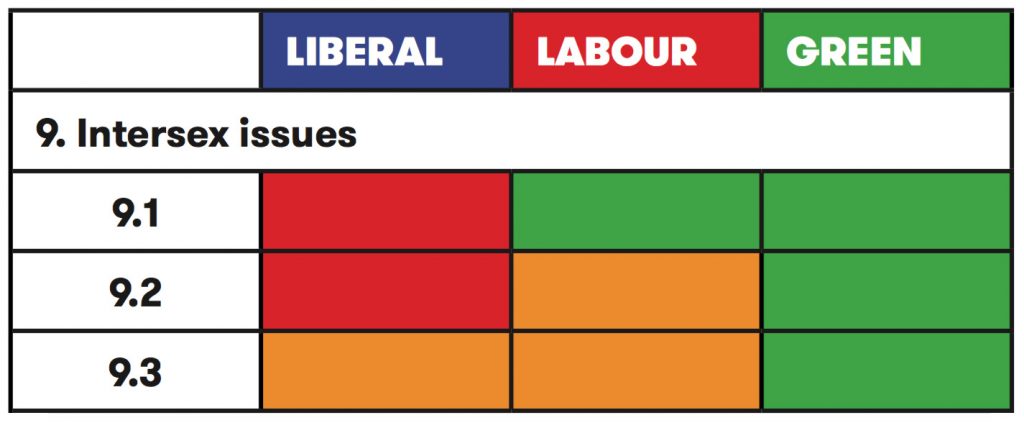Rainbow Votes: intersex issues in the federal election
OII Australia and eight partner organisations collaborated in Rainbow Votes, coordinated by Corey Irlam.
The Rainbow Votes coalition appreciates the comprehensive responses by the Australian Greens, Australian Labor Party and Liberal National Coalition to our 2016 LGBTI election survey.
Members of the Rainbow Votes coalition of LGBTI rights and health organisations have assessed the content of the responses to provide a guide of Full Commitment, Partial Commitment and No Commitment/No Response. This is included later in this document and for seperate download from rainbowvotes.com.au
In addition to the responses from the three major parties, you can download the statements and responses made by the Australian Equality Party (AEP), Australian Sex Party (ASP) and Nick Xenophon Team (NXT) from rainbowvotes.com.au.
The 2016 Federal Election to be held on Saturday 2 July is one of the most important in recent memory for the LGBTI* community. While marriage equality has been a feature of the campaign, with some commentary on safe-schools, most of the issues facing LGBTI people have received little or no attention throughout the campaign.
We hope the provision of clear policy statements from the parties will help individual members of the LGBTI community and our allies in determining who to give their vote to this election.
Summary of intersex issues

Summary of intersex responses by the 3 major parties using traffic light colours (see below for explanation of the numbers)
9. Intersex issues
9.1 The UN states that “intersex people are born with sex characteristics (including genitals, gonads and chromosome patterns) that do not fit typical binary notions of male or female bodies”. Intersex people have very some specific and distinct health needs.
- How will your party protect the rights of intersex people?
- Will your party ensure that children born with atypical sex characteristics are not subjected to medical interventions to modify their sex characteristics without their personal consent, when undertaken for social or cultural reasons such as marriage prospects, gender incongruity or parental distress?
- Will your party ensure that people with intersex traits have the right not to undergo sex assignment treatment?
- Will your party offer redress to intersex people who have been sterilised without evidence of medical necessity?
- Will your party ensure that intersex children, adults and their families have access to independent community-based support?
9.2 Research published in 2016 shows 18% of people born with atypical sex characteristics fail to complete secondary school, compared to an Australian average of 2%. This can be attributed to bullying on the basis of their physical sex characteristics and assumptions about identities, medical interventions during puberty, and a lack of inclusive curricula and support in schools.
- How will your party address these issues?
9.3 Will your party remove sex/gender classifications from official documents except where there is a legitimate policy requirement?
Note that we published these as our election priorities on 8 May, after discussions on the board of OII Australia.
The responses reflect considerable progress in understanding of intersex issues by the major parties since the 2013 federal election. Responses to the 2013 election survey are available here.
Co-chair Morgan Carpenter comments:
“It is wonderful to see some political parties finally begin to address the stigmatisation and treatment of people born with intersex bodies, in line with concerns stated by the UN and other international human rights organisations.”
More information
Coalition survey response, 2016
Australian Labor survey response, 2016
Greens’ survey response, 2016

You must be logged in to post a comment.